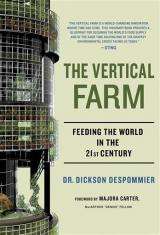'Vertical Farm' envisions tall future for farming

(AP) -- A new book by an urban agriculture visionary aims to change the way people think about farming, offering a look into a future where city skyscrapers - not rural fields - produce the world's food.
In "The Vertical Farm," Dickson Despommier challenges the notion that plants should be grown in soil, advocating for developing and investing in big projects using hydroponic greenhouses and other indoor growing technology in cities.
The goal is to provide safe, fresh food around the globe in a way Despommier says is impossible with modern farming. He acknowledges that getting to that future might be expensive, but he considers it a challenge akin to the space race.
"There is nothing stopping us from doing that any more than there was nothing stopping us from going to the moon," the 70-year-old Despommier said in a recent interview about the book, his third, released this month by Thomas Dunne Books/St. Martin's Press.
Despommier (pronounced 'DAY-palm-YAY) developed his ideas as a professor of public health in environmental health sciences at Columbia University. He and his students spent the past decade studying ways to incorporate agriculture into urban areas and developing plans for high-rise farms.
Despommier, who retired in January, has been a leading voice promoting the possibility that urban agriculture could be more than community plots on vacant lots in cities like New York and Detroit. His ideas tend to be grander in scale - and more enmeshed in new technology - than those of others in the field.
He envisions growing crops in indoor areas more concentrated than farm fields, and herbicides, pesticides and fertilizers wouldn't be used. Towers could be built just for growing, or empty buildings could be converted.
In its ultimate form, Despommier envisions a system for farming that would use energy from burning human waste, for example, and biofuels from the vertical farm itself to help power extremely energy efficient grow lights. Fish and poultry could be raised in the buildings, along with fruits and vegetables.
Some of those steps are taking place already on a smaller, lower-tech scale. In Milwaukee, for example, former pro basketball player and urban farmer Will Allen has created a self-sustaining system of fish and vegetable farming.
And companies such as Cornwall, England-based Valcent Products Ltd. make systems to grow indoors in warehouses or other buildings. Valcent's CEO Chris Bradford credits Despommier for pushing the boundaries of what might be possible.
"The concept grasps people's imagination and they start thinking about whether urban farming is a practical solution," said Bradford, who expects his company's VertiCrop system to begin being used in the U.S. in early 2011.
Despommier acknowledges that the vision presented in the book is far off. Or as environmental justice activist Majora Carter writes in the book's foreword: "If the skyscraper farm is like a 747 jetliner, we are now at the stage of the Wright Brothers."
But, Despommier notes, that's still a point from which to start.
The book includes an overview of how the farming developed, as well as laying out ideas for what vertical farms could become. Despommier advocates investing hundreds of millions of dollars in federal money in research at urban agricultural centers around the country where prototypes could be built and ideas hashed out.
"What could be more worth spending money on, in my view, than to try to get everybody safe food and water?" Despommier asked.
More information: Vertical Farm Project: http://www.verticalfarm.com
©2010 The Associated Press. All rights reserved. This material may not be published, broadcast, rewritten or redistributed.
















